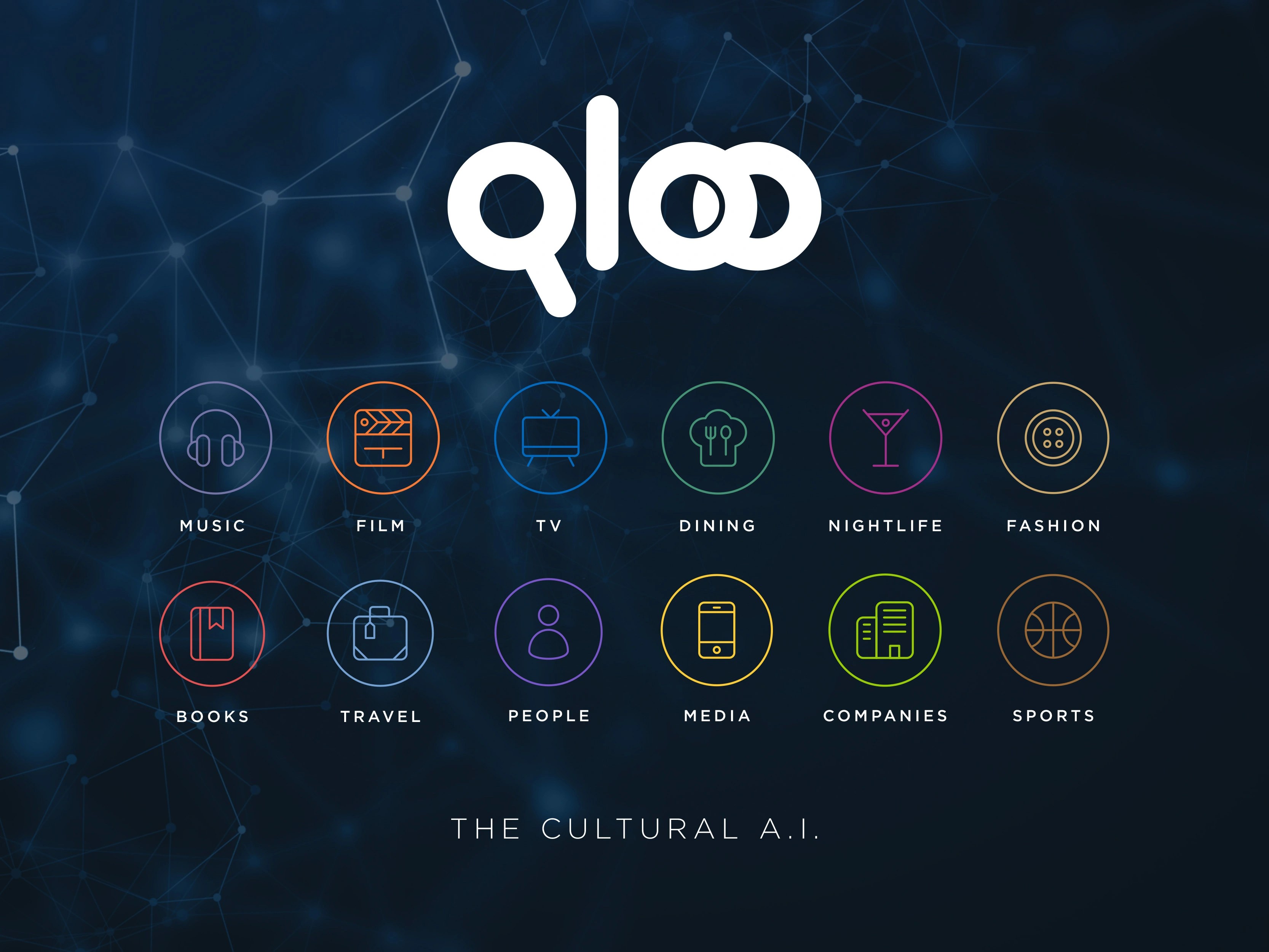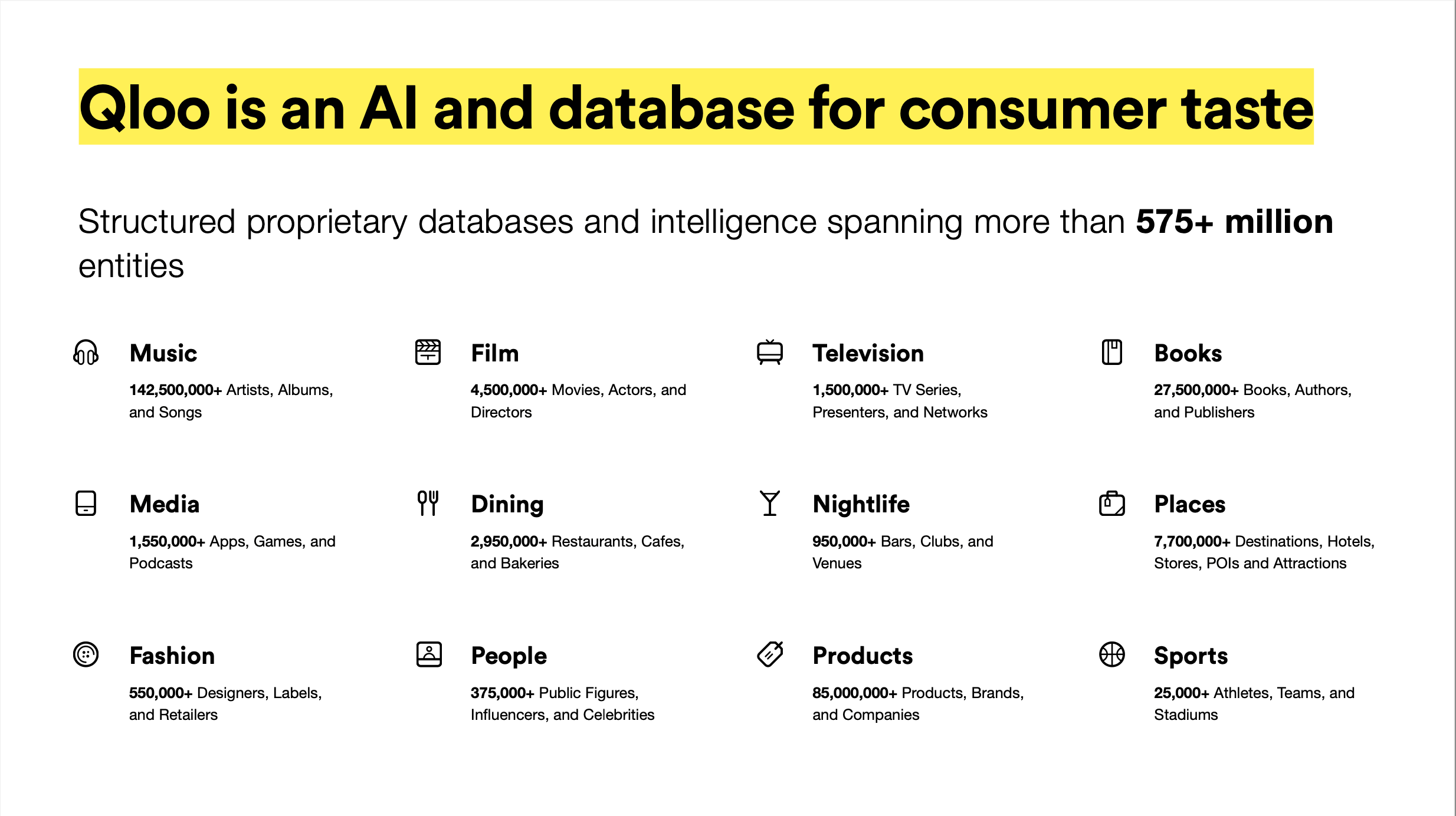ARTICLE AD
The buzziest AI today — GenAI — is an undoubted labor savor, generating images, emails, songs and more in record time. But one of AI’s more useful applications in the long run might be identifying the counterintuitive correlations humans miss. Consider, for example, that people who like horror movies might be inclined to try certain exotic cuisines, while people who prefer sitcoms might listen to a lot of true crime podcasts.
Qloo, a New York-based startup, has made it its mission to apply AI to understand these types of nuanced taste and culture patterns. Founded in 2012 by Alex Elias and Jay Alger, Qloo seeks to uncover consumer behaviors and trends across entertainment, fashion, travel, sports, food and other segments.
Elias, an NYU Law School graduate, says that he was inspired to found Qloo after noticing a gap in the market for what he calls “taste knowledge.”
“As a passionate advocate for culture — I play the tenor saxophone and piano, and have a deep appreciation for midcentury cinema — I saw the fragmented world of taste knowledge,” he told TechCrunch in an interview. “I noticed that while companies like Spotify, Expedia and Netflix dominated their respective sectors creating data silos, there was a lack of a unified system capable of understanding and predicting diverse personal tastes across different domains without relying on identity-based data.”
So Elias teamed up with Alrger, who previously led the digital marketing agency Deepend, to launch Qloo.

Image Credits: Qloo
Today, Qloo offers companies AI-generated correlation data across many culture and entertainment domains, including film, travel, nightlife, literature and so on. The platform’s knowledge of a user’s taste in one category or genre can be leveraged to deliver suggestions in another category, for example applying TV favorites to game-buying behaviors.
“Qloo operates a sophisticated AI-powered insights engine comprised of … behavioral data from consumers around the globe,” Elias said. “Qloo’s proprietary AI models are capable of identifying trillions of connections between these entities. With a profound understanding of consumer behavior for over 575 million entities worldwide, our technology enables contextualized personalization and deep insights into the intricate connections behind people’s tastes.”
Now, that’s a lot of personal data Qloo’s working with — which certainly gave this writer pause. Where’s it all coming from and where’s it stored? Elias wouldn’t say — but he was quick to assert that Qloo doesn’t rely on personally identifiable information and adheres to the requirements of privacy laws including GDPR and the California Consumer Privacy Act.
“Qloo maintains a comprehensive Ethics Policy that prioritizes ethical, transparent, and responsible AI development and deployment, as well as data privacy and security,” he said. “Specific to data and privacy, Qloo upholds the highest standards of data privacy and security and will not leverage any form of personally identifiable information or copyrighted information in any of the modeling pipelines.”
Whether that’s true, major customers are embracing Qloo to power their product experiences, Elias claims. For instance, Starbucks is using Qloo to create in-store music playlists tailored to specific neighborhoods. Hershey’s is tapping the platform to customize the content of assorted candy bags. Michelin is using Qloo to serve recommendations in its Michelin Guide App. And Netflix is leveraging Qloo’s tech to enhance merchandising by identifying actors who resonate with certain demographics.
Those customers — and Qloo’s ~60 others, which span PepsiCo, Samsung, The New York Mets, Buzzfeed and Ticketmaster — are helping Qloo appraoch profitability. The company makes money by charging a monthly subscription fee for access to its platform through APIs; Elias says contracts start in the “five figures.”

Image Credits: Qloo
Having today raised $25 million in a Series C round led by AI Ventures with participation from AXA Venture Partners, Eldridge and Moderne Ventures (bringing Qloo’s total raised to $60 million), Qloo is setting its sights on expansion. In addition to building a self-service research tool aimed at marketers and medium- and small-business customers, the startup is introducing what it calls a “multi-person recommendation AI,” which can match the profiles of any two people in Qloo’s database based on their preferences. Elias sees it being used in dating apps.
“The tailwinds from privacy and AI have greatly overpowered the headwinds from any tech slowdown,” Elias said. “Qloo has seen widespread contract expansion from the existing customer roll, looking to consume new data domains and areas of taste knowledge as well as address new use cases like generative itinerary planning and dynamic personalization using Qloo’s AI. Qloo is also seeing demand from new addressable markets, such as real estate, as well as accelerated sales cycles across the board despite increased compliance requirements.”
With the new capital, Qloo plans to expand its 50-person team to over 100 people by the end of the year and “pursue opportunistic M&A.” In 2019, Qloo acquired TasteDive, an entertainment recommendation engine, and Elias implied that future acquisitions would be along similar strategic lines.

 1 year ago
60
1 year ago
60 

